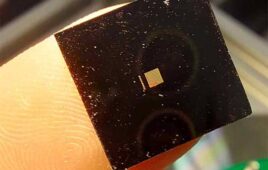
ICD devices [Image from Medtronic]
Those who have had a ventricular arrhythmia, heart attack, survived sudden cardiac arrest and have a congenital heart disease typically have an ICD implanted, according to the American Heart Association. Approximately 10,000 new ICDs are implanted each month in the U.S. alone.
However, these ICD devices can administer shocks when it is not necessary, which means the patient has to go see their doctors after the shock anyway.
The Stanford researchers analyzed electronic health data and patient data from 10,266 patients who had ICDs implanted between 2008 and 2010. All of the implants were manufactured by Medtronic. From that pool, they picked 963 patients who had an ICD shock more than once.
Researchers found that over one-third of the shocks were not needed and almost half of those who received an unnecessary shock had to receive some type of healthcare related to it.
Some defibrillators administer unnecessary shocks when there is a problem with the system, like if a wire breaks and makes an electrical noise that the system thinks is an irregular heartbeat. The implants also have the potential to shock and correct irregular heart beats when it isn’t necessary to do so.
“Sometimes the defibrillator gets tricked, and it misinterprets what the rhythm is,” said Matthew Reynolds, one of the study’s co-authors and a cardiac electrophysiologist at the Lahey Hospital and Medical Center in Massachusetts.
The healthcare costs following a shock can range anywhere from $1,300 to $20,000 for a single patient in outpatient and inpatient care, regardless if the shock was needed or not.
“You’re putting these in to do their job to save patients’ lives,” said Mintu Tarakhia, senior director of research at the Stanford Center for Digital Health and a cardiac electrophysiologist. “But we live in a bit of duality with implantable defibrillators.”
Researchers also found that some of the patients who received a shock were hospitalized 1 out of 7 times. because of the shock, the patients then had to undergo a variety of heart tests, including stress tests, cardiac catheterization and an echocardiography.
Reprogramming the ICDs to be smarter and know when to administer a proper shock can reduce healthcare costs.
“Fortunately, the industry has made many advancements in this area,” said Turakhia. “Even older-generation devices can be programmed to be smarter. The quality of care is no longer just an issue of whether an ICD was implanted in appropriate patients but also whether it was programmed in the best way possible.”
The research was funded by Medtronic and published online in the Circulation: Cardiovascular Quality and Outcomes journal of the American Heart Association.
[Want to stay more on top of MDO content? Subscribe to our weekly e-newsletter.]




